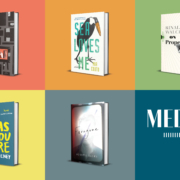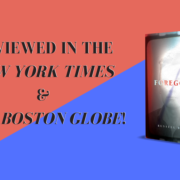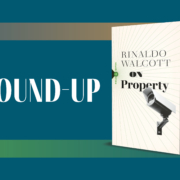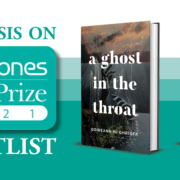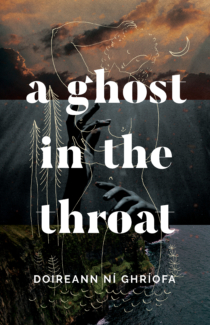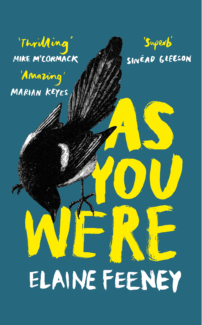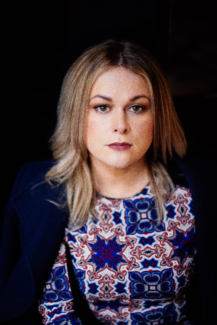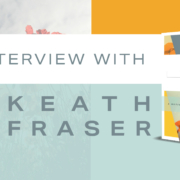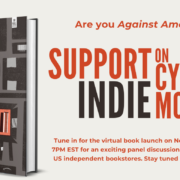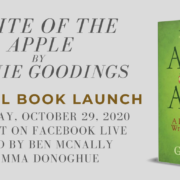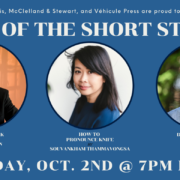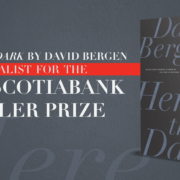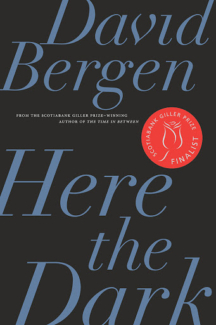The first time I came across your work was in university, when a very good friend of mine put Popular Anatomy in my hands, a work of ingenious humour, ambition, and poise. And I’ve read and reread your short stories for years: working with John Metcalf makes such a prerequisite. But when I was preparing for this interview, it struck me, with mounting astonishment, that Charity will be your first new work of fiction in a quarter of a century, since 1996’s Telling My Love Lies. I know that you’ve done other things in the intervening years – there’s been two works of nonfiction, a selected stories, and there’s a much larger gathering of new and selected stories coming out with Biblioasis later this year – but it’s possible that some readers may be coming to your work for the first time. Could you provide us a bit of an introduction?
Your generous question stumps me. I don’t think I’d be very good on a dating website either, trying to encapsulate myself in a cluster ad: Sense of humour, likes Rock ‘n’ roll, seeking a good read … And then you meet me: he thinks that’s funny? he likes Jackie Who? how tedious his lust … In other words, introducing oneself in this way has about as much to do with what one’s actually like, as a French menu does the food in a no-star restaurant north of Hope. If you like, instead of introducing myself (and thank you, Dan, for reminding me of my suspicious lapse of vocation), I could offer you an introduction to Charity … I’m thinking of its opening sentence. I seem to remember it was organically sourced over lunch in my backyard.
Well, as to vocation … er … sorry about that. So much for it being the backbone of life. So then, about that opening sentence. It seemed as unlikely as the venerable Shakespeare actor once dating a Supreme. Organically … sourced, you say? Tell me more.
Two summers ago, talking with friends at my picnic table – themselves sourced from the Sixties, so just as prone as the chef to reminiscent wallowings – I wondered aloud if they happened to remember as I did that Laurence Olivier had once dated a Supreme. Diana Ross, his unlikely fling, later presented him with an Oscar for some kind of lifetime achievement award in Hollywood, where his hand-on-a-balding-brow acceptance speech caused Jon Voight, sitting in the tuxedoed audience, to grab his own head in astonishment at the star-vaulting eloquence – a gesture that appeared to mirror Olivier’s ridiculous speech. Anyway, after lunch, I began to wonder where such a conjunction of ageing Shakespearean actor and youthful Motown singer might lead in a story … (Some such conjunction seems the necessary spark before any story I write begins to evolve.) It then took me seven months to complete Charity. (A novella always takes me seven months to complete, why?) When a fiction scales up, when characters assign themselves to plot and metaphor: as a writer, you’re surprised and pleased to see how much further a narrative is willing to go before its seeming endpoints turn out (instead) to be turning-points along the way to resolution. Capturing bits and textures of one’s own life and city (Vancouver) add to the satisfaction of the evolving complexity. If I had to describe Charity‘s default mode, probably my own mode, instead of tragi-comic I might call it ironic-tonic. Probably not so apparent in the story is its Lear-Grimm underpinning, though I’d like to think such allusiveness helps keep the comic bits bobbing along and the story’s darker side a little more lyric.
The ironic-tonic. I like that. This definitely comes through, and brings up another thing I wanted to ask about. Charity is very funny, if often uncomfortably so, leaving your reader wincing as they laugh: “… like mating the family’s pet goat to a rubber raft.” I laughed – the image was impossible to unsee – and felt pained at the same time. How could a father say this about his own daughter?
Greta’s father is not a card-carrying member of the wokerati. Patrick is an old-school physician, himself overweight, whose profession no longer permits him to suggest dieting to clearly overweight patients unless they bring it up first. He’s also against new, minority quotas for med-school eligibility. And based on considerable clinical experience, he presumes to diagnose illnesses, such as his daughter’s later addiction, by foregoing any careful case history. This king of the castle is used to being treated royally by his daughter’s stepmother, Denise, who narrates Charity, and about whom the story is concerned as she reflects back upon, and then decides to change her life, by turning his estate which she owns into something else. Still, as a story about fathers and daughters, pivoting on echoes of Lear, it reminds us of how Lear treated his own daughter, by exiling her. Any seeming child abuse in Charity actually involves smoking, not sex; the ruse, susceptible to a misreading, is meant to augment the classic theme of the mistreated daughter and, at the same time, to undercut it. Denise, you’ll remember, comments on Patrick’s “outlandish equivalences” – and the novella poses other such extremes, not just Patrick’s. I think any interesting story requires metaphorical equivalences which avoid the sort of received ones that replicate like common viruses. Wit, in its truest sense, is unpredictable and thereby arresting. It may be humorous; it tries to avoid boredom. In a life of extremes (and who knew Oliver Sacks had been a gay drug addict, rode motorcycles, and was a weight-lifting champion in California), the famous neurologist mentions in his autobiography how a schoolmaster once wrote of him, “Sacks will go far, if he does not go too far.” Well, in fact, he did go far – by going too far. His narrative case studies are famously exorbitant. And think of his later friend Harold Pinter’s plays: extreme fictions these, their dark comedy deriving from outlandish equivalences by way of character, language, plot. I really don’t think of myself as a comic or humorous writer. I’m usually just trying to keep the reader from feeling she’s read all this elsewhere before – and is maybe amused enough to keep on. Something worthwhile, if only another equivalence, might emerge to justify the keeping on.
The title of your book seems, on first glance, simple enough. But the more I think about it, the way the word is used in the novella, the way it is withheld, offered, its very lack at key moments when it’s needed most, its relationship to love, loss, other virtues; as a title, a word, it’s quite devastating. It’s an onion of a word, a title. Put me out of my misery: peel back a layer or two for us.
Charity is one of those reverberative, single-word titles favoured by Alice Munro. I wanted to dissociate the Biblical notion of charity – which insists that of faith, hope, and charity, the greatest of these is charity. Denise, the story’s main character, comes to believe that the greatest of these is actually hope. Without hope, love, including self-love, isn’t really possible; and devoid of hope, one has no future and thus no sustaining faith. Forced to contemplate the despair facing her drug-addicted stepdaughter, Denise wonders what hope remains for this young woman after returning from Africa. Patrick still thinks his crackerjack offspring will become a physician and some day take over his clinic. Coming back, Dan, to your uncomfortable laughter at his jokey comments about his own daughter, I made an early note: “The complexity of loving & laughing at a loved one. At a fat person, at an old one.” The old one here, Rudy, is an ancient family friend who has begun to court young Greta. As the story unfolds, Rudy’s unsuspected “charitable side” becomes the model for the kind of “extreme charity” that eventually affects both Greta and Denise. The complexity of love, at least on Denise’s part, evolves through her increasing regard for the foolish yet noble Rudy. His character grows more sympathetic, similarly hers, as the novella densifies. Denise’s dedication to her daughter’s future emerges with the reckoning of her own unfulfilled past.
Let’s step back for a second: you mentioned earlier that the writing of Charity took seven months, that novellas always seem to take you that long. Charity is launching a new novella series at the press. You’re known mostly as a short story writer, though you’ve worked in a range of forms; your novel, Popular Anatomy, was gargantuan. People have a hard time figuring out what to do with the novella, how to define it. Is it just a long short story? A short novel? Something else? Are there any challenges particular to the novella? Why seven months?
I suppose seven months reflects my writing-speed for a revised manuscript of novella length. Since all writing is in the re-writing, my usual seven months does suggest that I must get through any number of revisions by then. Many years ago, when I was far from finished Popular Anatomy, but recalling fondly the more immediate rewards of writing shorter fiction, I essayed: “In a way, though not necessarily, the short story mediates – meditates, even – between the denser texture of the lyric poem and the attenuated narrative of the novel. It is a meeting ground for another use of language, though not a different kind…. I think of the story and novella as spiritually restorative forms, in the way a summer cabin is, where solitude winnows worry, and where the first deep breath puts us in touch again with the natural world.” Charity arrived as a kind of escape from the city novel that I’ve been working on since Noah was a youngster. And yet this novella still allowed me to retain Vancouver as an abiding character (albeit more in sketch than portrait. Two long, uncollected stories in Damages also include such sketches). You and John Metcalf are to be congratulated for launching Biblioasis’ novella series, as it will draw attention to a greater consideration of the language and structure required (even by the novel) to tell a story without longueurs. Compression, surprise, delight: the qualities we value in fiction: it’s these the novella fosters.
I’m afraid, Keath, that my questions begin to pile up, and we’re running out of space, for now. So here’s a few to do with what you will.
Without smoke / that is how / good old wood / burns / that is how / I want to live … These remembered lines, from Miriam “Somebody” (better remembered as Waddington) do more than pivot the narrative, both for a young Denise and much later a struggling Greta, towards one (or more) of its emotional climaxes. They also raise again a question central to Charity, or so it seems to me: how to live. To be the hero or heroine of your own life; or, as Patrick says at one point, to give yourself over to something. What makes a good life, a good death. Was Rudy’s death foolish or honourable?
Henry Green, in his Apologia, says that his style was developed to prevent experience from being swallowed too quickly. The goal was to slow the reader down. I had a hellish time with Samuel Beckett until I heard it read properly, and realized that I had been galloping along, reading it far too quickly, missing the rhythm. So I read it aloud, slowly, as I would speak it, or at least hear it spoken, and the work opened up. Your work, and this novella, requires much the same. You mentioned earlier that it densifies, and this seems a perfect description. As the story progresses it becomes weighted with allusion and possibility. And speaking of possibility: Is it remotely possible Rudy is Denise’s real father? I know I am almost certainly wrong, but I can’t seem to shake it, and the last scene with Rudy and Denise as he reads Grimm’s fairy tales – Now that he had found her again, she was more dear to him… – reinforces this. The final line of Princess Mouseskin – very Learish, that fairy tale – can’t be there at the end of the book by accident: it must serve some sort of (compression, surprise, delight) key.
I’ll try to address your recent questions in one go. I like your idea of slowing down a reading to enrich what a story (even one, seeming swiftly sketched) has on offer. I don’t have space to do justice to your perceptive observations, but the weighted allusiveness that you mention is rampant and might invite a second reading of Charity. Rudy’s death – is it honourable or foolish, you ask. A small question, opening into much. Rudy appears to play the fool, and yet he’s also a Lear figure in his ridiculous old age (Greta’s nickname for him, Kim, was also Laurence Olivier’s nickname).
And so a story about fathers and daughters (but also, mothers and daughters) is a kind of fairytale full of cuckolding, dueling narratives, female infanticide, and trying to please fathers. Your diffident question about whether Rudy is Denise’s father is what I would call the illegitimate but valid question in literature: it exists outside the context of a narrator’s awareness, though maybe not, in Denise’s case, outside her sensibility. (Ditto Nick Carraway’s sensibility, in Gatsby: is Nick gay? He never acknowledges this, but there’s evidence to suggest he is. In Charlotte’s Web, a fairytale about deciding not to eat a pig, I’ve also wondered if E.B. White’s naming his farmer Zuckerman was intentional.) You might consider Rudy’s “extreme charity” toward the end of his life: is this something Denise might have inherited from her father – not from the man she calls her father, from whom she inherited her estate, but from their family friend Rudy, whose example leads her to sell off her estate as a life-line for daughters not least her own. Is there a physical resemblance between Denise and Rudy? (At one point, Judy alludes to Rudy’s lack of “buns” – and later to Denise’s diminutive backside.) And what imagery might allow us to see a connection between Denise’s opera-conscious mother and the unpolished Rudy? (Talk about characters’ sensibilities, seeming at odds, and yet an electrician with a Haida-carved front door …?) The challenge of a novella, given its spatial limitations, is to interweave its backstory as if past time is the very fabric of its present narrative.
The metaphor of smoke and mortality, for example, threads itself throughout Charity and compresses Denise’s decades down to the poem that you quote, and whose motto she remembers as wanting to live by, to burn as an ageing woman without smoke, just as “good old wood” burns “to be / fire”. (Her name, Catalpa, the name of a tree, does suggest a woodish pedigree.) Ah, yes, age and its imperatives. If there exists yet what we might call a fiction of ageing, it certainly hasn’t captured the public readership it merits, possibly because the writers most inclined to compose it have lost their youthful ambition (and fire) to share what they’ve come over time to know. And for younger writers, time is still too short to appreciate how wide the experience of ageing actually is (the pawky allusiveness it offers). This is Denise’s challenge, in narrating her own story over decades. She’s older than both Patrick and Judy, is of a passive generation (of daughters) whose career options, restricted, was once hemmed in by convention. Increasingly able to see a new role for herself, and possibly for her step-daughter, what chance now in older age to burn with a reignited purpose?
ABOUT CHARITY
Denise Catalpa’s stepdaughter Greta is a medical student who doesn’t so much as struggle with her obesity as embrace it with the same gusto with which she munches on pepperoni sticks. Her father Patrick doesn’t care so long as it doesn’t interfere with her studies and her eventual takeover of his family practice. Rudy Skupa is an ancient family friend who seems to have taken a romantic interest in Greta, to her parents’ – including birth mother Judy, who begins to insinuate herself back into the family’s life – aggrieved consternation: this March-November yoking seems as unlikely as “the venerable Shakespeare actor once dating a Supreme … like mating the family’s pet goat to a rubber raft.” But when Rudy’s charitable spirit infects Greta and the two take off to Africa to help those most in need, the family’s life is turned upside-down. And when she returns after Rudy’s death, grief-stricken and wasting away, Denise, Judy, and Patrick are brought closer together as they try to rekindle Greta’s passion for living.
Charity, the first new work of fiction published by Keath Fraser in a quarter-of-a century, is a masterfully compelling story about mothers and daughters, daughters and fathers, and the alchemical ingredients necessary to make a life worth living: faith, hope, love, and yes, in all of its myriad guises, charity.
ABOUT KEATH FRASER
Keath Fraser won the Chapters / Books in Canada First Novel Award for his 1995 novel Popular Anatomy. His stories and novellas have been published in many anthologies in Canada and abroad. Collections of his short fiction include Taking Cover and Telling My Love Lies. The volume Foreign Affairs was short-listed for a Governor General’s Award and won the Ethel Wilson Fiction Prize. He is the author of As For Me and My Body, a memoir of his friend Sinclair Ross; and of The Voice Gallery, a narrative of his far-flung travels among broken voices. The royalties from his international best-selling anthologies Bad Trips and Worst Journeys: The Picador Book of Travel were given to Canada India Village Aid (CIVA), the late NGO founded by George Woodcock. His lives in Vancouver.
You can purchase a copy of Charity here.

